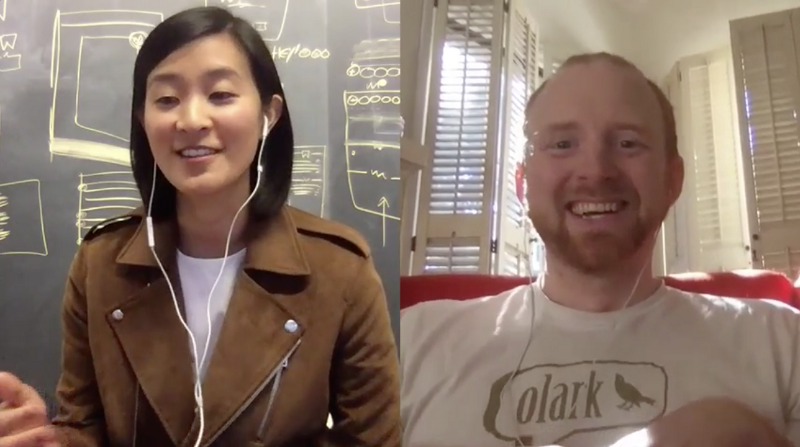Running Olark, a company with 12,000+ customers, Ben shares the biggest leadership lesson he wishes he learned: The importance of self-awareness and emotional intelligence as a leader.
Claire: Hi everyone, I’m Claire Lew and I’m the CEO of Know Your Company, and today I’ve got a really special guest. We have here Ben Congleton who is the CEO of Olark, a chat messaging service for businesses, which if you don’t use, you might want to look into it. We’re actually happy customers, that know your company. I don’t know if you knew that Ben. But, yeah.
Ben: I didn’t but that is fantastic.
Claire: We love it. But yeah Ben and I met maybe a year and a half ago. We spoke on the same panel at a conference. I’ve always just really admired the way you’ve thought about growing Olark. It’s now 40 people.
Most recently what’s been really interesting is Ben had a email that went viral. So, we may end up talking about this, may not. But for those of you watching one of his employees had sent him an email asking for a mental health day off, to maybe you know to cope with some anxiety and Ben’s response to the email essentially went viral. So, I’m not going to give any more away, you can look it up, it’s actually one of the links I posted in our newsletter, I think in Issue 1 or 2, so you can check that out. No, and you guys at Olark you’re doing a lot of fun stuff. I know you rolled out a new Slack integration, so you’ve been busy. So, thank so much for your time, excited for you to be here.
Ben: Yeah, I’m really excited to get the chance to chat Claire also.
Claire: Awesome. So, Ben I’ve got this one question for you, all right, that I’ve been asking a lot of leaders lately, which is: what’s one thing you wish you would’ve learned earlier as a leader?
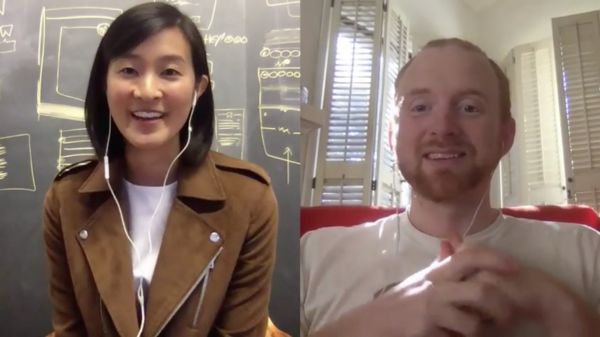
Ben: So, I had the fortune of you giving me the prompt early, like a second ago, like I haven’t had too much to think about it, but I think to me it really sort of comes down to self-awareness. I think that a lot of leaders think they, know how there’s a lot like they want to motivate people, or they want to build really strong teams, or they want to have some trick for BD or something like that.
But for me I think the number one important lesson to learn is just the importance of self-awareness.
Claire: Yes.
Ben: And when I say that I mean like understanding your mental state. Like where you’re at when you enter the conversation. One thing that a friend of mine once told me is like you know, like college, what’s really important is you get the assignment done and you turn it in one time. I think that like in leadership and in business, what’s more important is that you’re able to bring your full self to the task at hand. So, that means like taking the time to prepare before going into something, so you know whether that be to like take a deep breath and just sort of step back from you know, some baggage or that previous conversation you just had, and walk into that new situation with a clear head. Or knowing that you can’t do that, and taking, and putting it on yourself to tell the other people in that situation like “Hey, my kid is sick, like I spent all day rushing around this morning and like really, like I just, I’m not in a good position to have this conversation right now.”
I think that to me, sort of getting to the point where you could like know yourself well enough to know, you know when you’re energized, when you’re de-energized, to know where you’re weak, to know where you’re strong, to know where you need help. That gives you a position where you can start growing yourself, right?
So, there’s this lady Carol Dweck who has this idea of like a growth versus the fixed mindset. And I think for the longest time, at least when I was first getting off, I was like starting Olark, a lot of times I would react to feedback in a very like fixed mindset way. That means basically when people would give me criticism I would look at it as a opportunity to defend my point of view, defend where I was coming from, to try and convince them of my approach.
And not really looking at it as an opportunity to grow, an opportunity that they are giving me a gift of this feedback, like they don’t have to say anything, they’re giving me this gift. And I want to understand where it’s coming from, and I want to understand like how I can take some of this information and use it to sort of improve myself, to improve my approaches to situations, and to grow.
I feel like I wish I could go back to the beginning and tell early Ben, you know the three people in the house, you know we’re just starting this company, like hey, like growth versus fixed mindset.
Claire: Yeah.
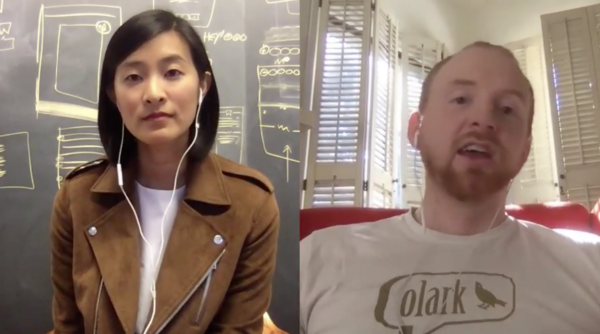
Ben: Understand when you’re in it, and if you find yourself getting defensive, it probably means that you are probably not in the right mental state to receive that feedback right now. So you can tell someone that. Or if you find yourself getting defensive take the time to write it down, try to understand what’s going on in your head, try to understand why you feel this way, and really try to grow from it. So that’s my one lesson for you is just, you know understand yourself, and understand what energizes you, and understand what causes you to have lower energy, and just continuously try to improve.
Claire: Yes. I was just nodding my head throughout the entire thing you were saying Ben because, yeah I mean, I think it strikes probably a cord with so many of the folks who are watching this. That lack of self-awareness contributes to so many miscommunication, angry blowups, you know conflict, and tension, and sometimes just bad decisions because you’re reacting to the mental state that you’re in, versus maybe seeing something for what it actually is, and being self-aware enough to see that. So, I love that you shared that. I’m curious, I mean you alluded to saying “I wish I could go back to the early days,” right?
Ben: Sure, yeah.
Claire: And sit young Ben down and tell him these things. I mean, so talk to me about like, was there something in particular, like a particular moments or something that happened in those early days where you went, “Oh, yeah that happened because the self-awareness just wasn’t there like it should’ve been.”
Ben: I think that you know in the early days of Olark I did a really good job growing in so many ways, but I don’t think that I grew as much on sort of the inter-personal level as I probably could’ve, had I been better at receiving feedback, and had I been better at sort of understanding the mental state I was in. So, I think when you’re four guys working out of, like living and working together, in a small house.
Claire: Yeah.
Ben: Like we had cats, my girlfriend moved in, like there was a lot going on.
You know it was pretty intense, and I think that, you know it helped me build strong bonds with my co-founders but I think at the same time there were situations that I think if I’d been a little bit more mature as a leader, or if I understood my limitations more, where they could’ve been handled, or situations could’ve been handled better. So, things like, without going into really any examples at all, sorry, but like HR level issues, hiring decisions.
I remember there was one point where I was trying to resolve a conflict between two employees, and I just was like my head was somewhere else, my head was just like “This is the last thing on my to-do list, I just need to get this done, and then I can hop on a plane and go see my family,” or something like that.
Just situations like that, where if you really are more self-aware and are able to understand yourself, understand what you’re going through, you can sort of head off some of the situations before they happen.
Claire: Yep.
Ben: Even something as simple as like “Oh, like man I hate when that person does this,” and you know like being aware that your emotions are real.
Claire: Yes.
Ben: That that feeling of like “Oh, why does this happen?” Just in any situation, right? Like that is a real emotion that you are feeling.
Claire: Yes.
Ben: You feel this working. Now there’s the other person on the other end, you know feels the same way as you, like are their life experiences the same as yours? Well odd are no. Right? Like every person is different, every person is motivated by different things. I think if you start off with you know situations like our core values that we put in place many, many years ago, one of our first core values was “Assume good faith.”
Claire: Yes.
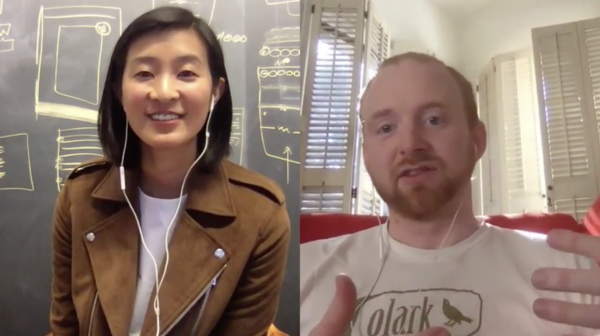
Ben: So you can assume good faith, and I think that is a really, really great place to start. But if you understand what’s going on inside of yourself, it makes it a lot easier to move past just assuming good faith and kind of take it to the next step, of really practicing, and understanding what’s going on with that person, understanding what’s going on with you, and being able to resolve issues. Now, I would say that on many levels, like kind of like when you’re three people, you’re really just building a product, right? You’re trying to get something out there, trying to build a company, that just exists.
When you’re 40 people, you’re really trying to take what you’ve built and scale it. So, you know really what you’re doing is you’re trying to empower this team of really amazing people you’ve brought together to do something that none of them could do on their own, and none of them could do inside of other organizations. So, to me that’s a change in what your role is as a leader, and it’s really about motivating and inspiring and helping people bring their whole selves to work, like this story that you alluded to before, is you know part of what my role’s become.
In the early days [my role was] like “problem solver of every problem that you could possibly have,” and now it’s more like “helping point us in the right direction and make sure that that is really inspired and excited to go where we need to go”, and that they have the support from the organization to move as much of the, like kind of annoying stuff out of the way, so they can just focus on doing what they’re really good at.
Claire: Yeah, absolutely. I think so many founders and CEOs and such can relate to feeling that role change, and feeling like “Okay, I used to do everything. You know I’m the doer, and now you know I don’t really talk to customers, I don’t really build the product, touch the product, and it changes,” and so I think that self-awareness becomes even more important as you manage those relationships and your role becomes more about communication and direction and vision.
Ben: I think actually, you know the other thing that kind of feeds in there very strongly, is just that you as a founder, as a CEO or whatever, like you have a lot of power in defining what your role is.
Just because you read in a book that a CEO should have to do these like five things, or something like that, you don’t necessarily have to do those five things yourself. Right? You can have other people in your team that bring strengths to the table, that are better than you at things. I think that that’s something that I have realized, like through my own growth, of just that my co-founder Matt, he’s really, really good at organizing our executive team. He’s far better than I am.
Claire: Yep.
Ben: And his role of CEO and you know I think that feeds in nicely there. But I think as you build that company out, like understanding where you’re strong and understanding where you’re weak, and really trying to surround yourself with people that are better than you, at the things that you’re weak at is, first of all it removes a ton of stress, of just being a leader.
And it also just increases performance of your team. So that’s been a transition that’s happened at Olark over the last couple of years, and it’s just been incredibly, incredibly powerful and a ton of fun.
Claire: Absolutely, absolutely. So, with this self-awareness then what do you do then, sort of, week by week or day by day, you know, these days to center, ground yourself? I’m taking notes here. You know, like what can you share with us to try-
Ben: What kind of got me over the edge? Like, honestly I think I’ve had these, like people are like “Oh, Ben you should read this book,” and there’s a book called Leadership and Self Deception, and there’s another called The Five Dysfunctions of a Team, and you know I read these books and I was like “Oh, these books are great, lots of self-awareness, they’re so meaningful.”
Claire: Right.
Ben: And then moved on day to day, back to work.
Claire: Yep.
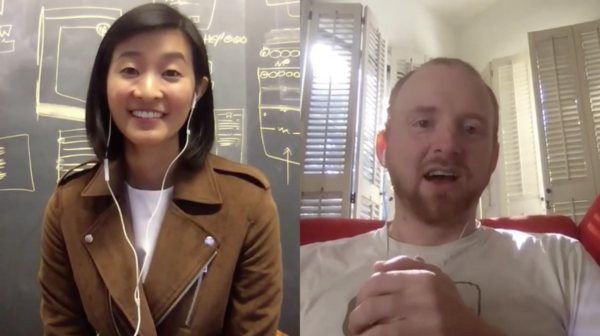
Ben: And you know I had the whole management team read these books, but still like I think what really pushed me over the edge, and I mean this is just probably more telling about me than it is anything else, but I like got an exec coach. Like I decided, like I had gotten feedback from one of our managers, said “Hey Ben, I think you’d really benefit from having an executive coach.” I had a really good friend of mind who’d been going to executive coaching and he just taught me about how meaningful it was.
Claire: Yep.
Ben: And I was like “Okay fine, I’ll give it a shot.”
Claire: Absolutely.
Ben: Went out an interviewed a bunch of potential exec coaches, and talked to one exec coach who was like, Lyft’s executive teams exec coach, and he was so good, but so expensive. Like I guess I understand why it costs so much to have a coach that’s good, but let me see if I can find someone I can afford.
Claire: Yes.
Ben: So, I talked to more people and that helped me have like a good upper bound for how good it was, and the way I actually got that guys name is I reached out to some friends, and I said “Who’s the best exec coach you know?”
Claire: Yeah.
Ben: Right, so I think like Andrew Warner pointed me in the direction of this guy, and there’s like an organization in San Francisco called Inner Space, where they have this guy named Joe, who’s the founder of Flixster, who now runs this non-profit trying to educate founders and a lot of his topics are around self-awareness, good management training, and he had recommended I talk to this guy too. So, that guy was fantastic, but out of my price range, and I talked to a bunch of different coaches, and eventually found my guy I really liked, that I’ve been working for about a little over probably a year and a half now.
Claire: Oh, wow.
Ben:
I think there’s a few benefits of exec coaches. One is they’re kind of like an accountability partner who has no stake in the game other than you. Right? So like your co-founder could help solve part of this problem but I think it’s nice to have someone who’s only job is to like force you to reflect.
Claire: Yes.
Ben: That was really what I think helped me a lot, was just to have this time set aside to force myself to reflect on a week basis. ’Cause things are so busy, it was really, really easy for me to like push it off, or like slide into it again.
Claire: No, absolutely.
Ben: It’d be like, go out and get some other more urgent thing done and I think it really took me having this responsibility to this other person, that pushed me over the edge.
Claire: Wow.
Ben: So that helped me a lot. I’ve also found that particular workshops that I’ve gone to have been really helpful, but I think a lot of it is just having that regular practice option that has helped me a lot. So, I mean if you can figure out a way to get that without paying someone else to do it-
Claire: Keep you on task.
Ben: I think that’s a really great way of doing it but it works pretty well.
Claire: Yeah, well I mean absolutely I have a few, you know, close friends who are incredible executive coaches, right, and I mean you sit down with them for 30 minutes and you totally understand the value. So, I’m absolutely with you there, and I think you also make such a good point then, it’s the repetition, it’s the practice, it’s stretching the muscle, like with anything, right? That if you don’t do it, if you don’t try it, if you don’t have a way to keep yourself accountable, you know it’s very easy to read the stuff in the books, maybe even watch stuff like this on YouTube et cetera, and feel like “Okay, I got it,” when in practice it’s always the hardest part. So, thank you for sharing that.
I’m always wondering what is the thing that pushes different leaders over the edge into putting stuff into practice. So, appreciate you sharing.
Ben: Yeah.
Claire: Awesome. Well thanks so much for making the time to do this, so fun to chat with you, and yeah, appreciate it.
Ben: Yeah, thanks so much Claire. This has been really fun. I’m really excited to you know keep watching the episodes and see where things go from here.
Claire: Awesome. Thanks Ben. See ya.
